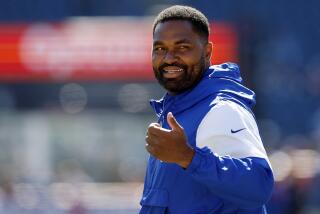Does making a change make a lot of sense for the Redskins?
- Share via
As the days of Redskinsanity creep by, with more interviews and intrigue on the coaching-search horizon, the same idea keeps returning to mind. If the Redskins, after four interviews with Gregg Williams, decide not to name their defensive leader head coach, then, for most practical purposes, Joe Gibbs might as well never have come back to town.
If the Redskins go outside their organization to hire a new coach, then that man, no matter how gifted he may be, almost certainly will bring with him or be given a new offensive and defensive coordinator. Then, what Gibbs assembled in four years, what he thought he was on the verge of accomplishing, inevitably will be torn down to its very foundation.
For the fourth time this decade, the Redskins would decide to raze their house and rebuild it. The day Gibbs resigned as coach, Daniel Snyder said that he wanted to emphasize “continuity.” Perhaps the owner meant continuity with the embarrassing era before Gibbs returned, when the only continuity was the constancy of change.
The Redskins’ best hope, if they bypass Williams, is that the team’s apparent progress under Gibbs actually was an illusion and that little worth saving was accomplished in his time back in Washington. If the Redskins initiate another radical change of direction, then one of America’s most valuable franchises had better cross its fingers that those two playoff visits the past three years were threadbare accomplishments, a testimony to luck more than sound construction and Gibbs’ gift for picking the proper people.
“I’m excited about the Redskins. They’ve got a great group there,” Gibbs said at a NASCAR news conference this week. “And hopefully there will be a lot of stability in what happens up there.”
Guess again, Joe.
The leading candidates to replace Gibbs sometime after the Super Bowl, aside from Williams, are perfectly credible choices, especially Jim Fassel, who has a winning record as an NFL head coach, and well-regarded Indianapolis Colts assistant Ron Meeks. Still, the Redskins need to grasp the impact of ignoring the obvious by turning away from Gibbs’ handpicked successor as well as a popular choice within the team.
Snyder and Vinny Cerrato, his executive vice president of football operations, have to be “comfortable” with their next coach. If the sight of Williams makes them break out in hives, if his taste in wines clashes with their entrees or if he just can’t hide that he thinks he knows a lot more about football than anybody else in the room, then that could certainly be a problem.
However, when an owner with a dubious track record just can’t seem to get comfy with a subordinate who has a sizable ego, the memory of Orioles owner Peter Angelos and his smart but prickly manager Davey Johnson comes to mind. Williams doesn’t have Johnson’s resume, but he has built defenses that ranked in the top 10 in the NFL in three of the last four seasons.
Some wonder if the Redskins already have burned their bridges with Williams, who specifically came to Washington so he could learn to handle people -- and smooth the edges of his blunt personality -- by exposing himself to Gibbs’ influence. If you worked for four years as one of the central architects of a business, yet your boss still needed to interview you four times, including one 10-hour marathon, to make sure you were the right person for the job, would you feel wanted?
When it comes to unleashing a locker room full of crazy, few teams surpassed the Redskins in the bad old days before Gibbs returned. Is the franchise in danger of heading back toward infighting and selfishness?
For the last two seasons, the Redskins stuck together. At 5-7 in December, after a 5-11 season in 2006, the bonds within the team still held fast.
Can that last? When an NFL team switches coaches and replaces both coordinators, as the Redskins well may, the whole team changes, too. It’s not just new coaches that show up. Soon, it’s new players or old favorites. And you usually can write off the first season as a painful “transition.”
For example, Norv Turner’s quarterback was Brad Johnson. Then in 2001, Marty Schottenheimer used Tony Banks. Steve Spurrier brought in Shane Matthews and Danny Wuerffel, then developed Patrick Ramsey. Gibbs praised Ramsey but brought in Mark Brunell. Ramsey quickly dematerialized.
More to Read
Go beyond the scoreboard
Get the latest on L.A.'s teams in the daily Sports Report newsletter.
You may occasionally receive promotional content from the Los Angeles Times.










